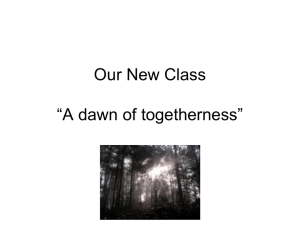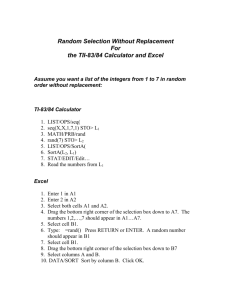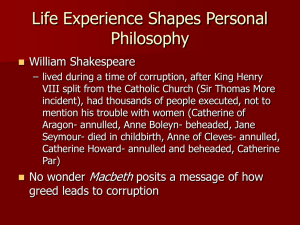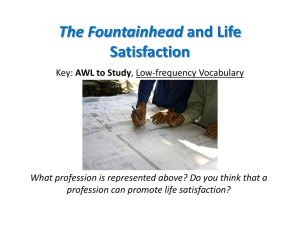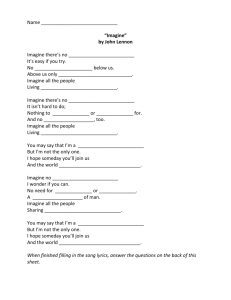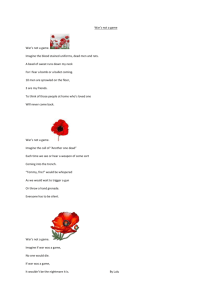Transcendentalism Project.doc
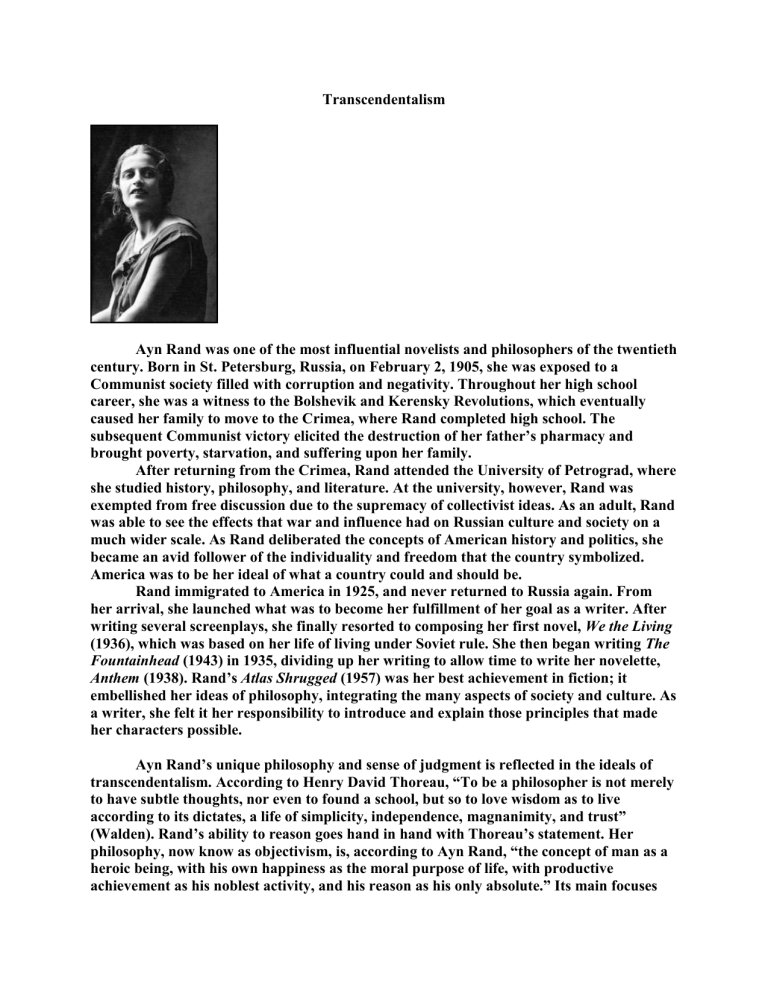
Transcendentalism
Ayn Rand was one of the most influential novelists and philosophers of the twentieth century. Born in St. Petersburg, Russia, on February 2, 1905, she was exposed to a
Communist society filled with corruption and negativity. Throughout her high school career, she was a witness to the Bolshevik and Kerensky Revolutions, which eventually caused her family to move to the Crimea, where Rand completed high school. The subsequent Communist victory elicited the destruction of her father’s pharmacy and brought poverty, starvation, and suffering upon her family.
After returning from the Crimea, Rand attended the University of Petrograd, where she studied history, philosophy, and literature. At the university, however, Rand was exempted from free discussion due to the supremacy of collectivist ideas. As an adult, Rand was able to see the effects that war and influence had on Russian culture and society on a much wider scale. As Rand deliberated the concepts of American history and politics, she became an avid follower of the individuality and freedom that the country symbolized.
America was to be her ideal of what a country could and should be.
Rand immigrated to America in 1925, and never returned to Russia again. From her arrival, she launched what was to become her fulfillment of her goal as a writer. After writing several screenplays, she finally resorted to composing her first novel, We the Living
(1936), which was based on her life of living under Soviet rule. She then began writing The
Fountainhead (1943) in 1935, dividing up her writing to allow time to write her novelette,
Anthem (1938). Rand’s Atlas Shrugged (1957) was her best achievement in fiction; it embellished her ideas of philosophy, integrating the many aspects of society and culture. As a writer, she felt it her responsibility to introduce and explain those principles that made her characters possible.
Ayn Rand’s unique philosophy and sense of judgment is reflected in the ideals of transcendentalism. According to Henry David Thoreau, “To be a philosopher is not merely to have subtle thoughts, nor even to found a school, but so to love wisdom as to live according to its dictates, a life of simplicity, independence, magnanimity, and trust”
(Walden). Rand’s ability to reason goes hand in hand with Thoreau’s statement. Her philosophy, now know as objectivism, is, according to Ayn Rand, “the concept of man as a heroic being, with his own happiness as the moral purpose of life, with productive achievement as his noblest activity, and his reason as his only absolute.” Its main focuses
are on the aspects of reality, reason, man, and capitalism. Like transcendentalism, objectivism embraces the ideals of independence and self-determination and the value of intuition that surpasses that of faith or reason. They are both philosophical and intellectual movements that have influenced society.
For more information about Ayn Rand, please visit the following websites:
The Ayn Rand Institute: http://www.aynrand.org/site/PageServer?pagename=index
Internet Encyclopedia of Philosophy: http://www.iep.utm.edu/r/rand.htm
Cast Away (2000)
The film, Cast Away, demonstrates the emotional and physical challenges incorporated in survival. Chuck Noland, a FedEx systems engineer, leads life against the clock. His business takes him to places all over the world, and his responsibilities for getting things done are vast and always at a fast pace. During a delivery flight to an overseas location, the plane crashes into the ocean’s depths in a severe storm. Being the sole survivor, Chuck finds himself stranded on a remote island. From there, he begins a long and tedious journey of enduring life alone and struggling to meet the necessities of survival.
Cast Away relates to transcendentalism through its reverence and significance of nature and surviving independently. In the film, nature tests the individual’s determination and perseverance to survive. Ralph Waldo Emerson, a 19 th century transcendentalist, stated, “What lies behind us and what lies before us are small matters compared to what lies within us.” Chuck exhibits the same strength and motivation as Emerson describes.
Although Chuck lost his companions and his ways of life, and was uncertain of what the future had in store for him, he still persisted with the hope of returning to the life he once led.
To view the Cast Away trailer, please go to this link:
Youtube http://www.youtube.com/watch?v=64rbb00iX3I
“Imagine,” by John Lennon
Imagine there’s no Heaven
It’s easy if you try
No hell below us
Above us only sky
Imagine all the people
Living for today
Imagine there’s no countries
It isn’t hard to do
Nothing to kill or die for
And no religion too
Imagine all the people
Living life in peace
You may say that I’m a dreamer
But I’m not the only one
I hope someday you’ll join us
And the world will be as one
Imagine no possessions
I wonder if you can
No need for greed or hunger
A brotherhood of man
Imagine all the people
Sharing all the world
You may say that I’m a dreamer
But I’m not the only one
I hope someday you’ll join us
And the world will live as one
The song, “Imagine,” describes a world without conflict or despair; rather, it is a promotion of peace and equality to every individual. Similar to transcendentalism, the song represents the innate goodness of humanity --- in which everyone can live together as one in peace. Lennon envisions a world where faith, borders, death, or suffering is nonexistent. As
Henry David Thoreau stated, “I would give all the wealth of the world, and all the deeds of all the heroes, for one true vision.” Corresponding to Thoreau’s statement, this song illustrates giving up greed, wealth, and all controversies and deeds for a vision of everlasting harmony.
To watch the “Imagine” music video, please visit the following site:
Youtube http://www.youtube.com/watch?v=b7qaSxuZUg
To learn more about John Lennon and his career, go to this site:
John Lennon http://www.johnlennon.com/html/news.aspx
The Scarlet Letter
The book, The Scarlet Letter, holds transcendentalist beliefs and ideals in its themes and characters. Hester Prynne, the acclaimed heroine of the story, committed the sin of adultery amidst those of a Puritan society. This was revealed through the birth of a baby
girl. As punishment for her sin, Hester wore the scarlet letter “A” on the bodice of her gown for everyone to see. As Hester continued to live with the burden of her sin, showing poise and strength in her character, people began to see her as a different person. "There glimmered the embroidered letter, with comfort in its unearthly ray. Elsewhere the token of sin, it was the taper of the sick-chamber. It had even thrown its gleam, in the sufferer's hard extremity, across the verge of time. It had shown him where to set his foot, while the light of earth was fast becoming dim, and ere the light of futurity could reach him. In such emergencies, Hester's nature showed itself warm and rich; a wellspring of human tenderness, unfailing to every real demand, and inexhaustible by the largest. Her breast, with its badge of shame, was but the softer pillow for the head of that needed one. She was self-ordained a Sister of Mercy; or, we may rather say, the world's heavy hand had so ordained her, when neither the world nor she looked forward to this result. The letter was the symbol of her calling……They said that it meant 'Able'; so strong was Hester Prynne, with a woman's strength" (Hawthorne 156). In this quotation, Hawthorne describes
Hester’s transition from being an image of sin to that of one with passion and boldness. She had shown strength among all those who scorned her for her sin. She bore the scarlet letter dutifully, enduring its burn and constant pain upon her heart every day. Her character resembles the transcendentalist ideals of self-determination and independence from society.
Arthur Dimmesdale, the admirable and respectful preacher of the town, also symbolizes the ideals of transcendentalism. Being the fellow adulterer, Dimmesdale kept his sin secret from the public. As a result, he tortured himself and begged for God’s forgiveness through his sermons. God’s will made him endure the torture that he inflicted upon himself. God sent Chillingworth to keep the torture in incessant motion as a reminder of Dimmesdale’s sin. Dimmesdale, who spoke words of wisdom and compassion of God, knew that his sin must be revealed to finally have God’s mercy and forgiveness. If only his sin was confessed would he be able to go to heaven in peace. Therefore, with this belief in
God, Dimmesdale lived to “tell the tale.” He lived to finally bring forth the secret that he had been hiding for so long to the people he knew and loved. His connection of the mind, body, and soul with God can be interpreted as transcendentalist.
In addition, Hester’s daughter, Pearl, has a nature that can quite verge on the aspect of transcendentalism described as the innate goodness of humanity. "Pearl, that wild and flighty little elf, stole softly towards him, and taking his hand in the grasp of both of her own, laid her cheek against it; a caress so tender, and withal so unobtrusive, that her mother, who was looking on, asked herself, 'Is that my Pearl?'" (Hawthorne 115). The innocence that Pearl displays in this scene clearly can relate to the ideal that all humans are good and pure in nature. Although Pearl shows signs of a rebellious, irking, and evil personality, her spirit is internally good.
Nathaniel Hawthorne, the author of The Scarlet Letter, respected many transcendentalist beliefs. Hawthorne relates to Emerson’s perception of the Oversoul through his characters. Similarly, he connects Thoreau’s views of nature into the crucial themes of the book, such as the forest. Like transcendentalism, The Scarlet Letter holds a spiritual and reverential meaning that greatly affects society and culture.
Journal
I believe in some aspects of transcendentalism, but not all. Nature has always been something that I loved and admired. People should respect the purpose and beauty of nature, and let it be their source of growth and comfort throughout life. I deem nature to be something of beauty, inspiration, and importance.
I, too, believe in independence and self-determination. It is important that individuals believe in themselves and have confidence in their own ideals and values.
Without having trust in one’s self, who is one to believe? However, I also think that support and love from friends and family holds importance. People such as these are a source of ideas, advice, and happiness that an individual needs every day. Without the help of others, an individual is less likely to have a happy and hopeful life.
However, I disagree with the belief that intuition surpasses that of faith or reason.
Reasoning is important, not only for making decisions, but also for spreading ideas. Ideas give people a new view of life, and can make communication between others more interesting and beneficial in understanding society. Instinct may not always be the right path to follow, especially in circumstances in which a thorough understanding is needed before performing any action.
Ultimately, transcendentalism is something that I can agree upon and respect in some aspects, but do not really follow. Although some of its principles make sense, others are not that practical or beneficial for society.
Works Cited
Works Cited
Ayn Rand Institute. 1995-2009. Michael Chiavaroli & Associates. 15 June 2009
<http://www.aynrand.org/site/PageServer?pagename=index>.
Digital image. Cast Away. 1999 & 2006. Solar Navigator/Lost Whale. 16 June 2009
<http://images.google.com/imgres?imgurl=http://www.solarnavigator.net/films_mov
ies_actors/film_images/Cast_Away_film_poster_Tom_Hanks.jpg&imgrefurl=http:// www.solarnavigator.net/films_movies_actors/cast_away.htm&usg=__YkNAJw59trq
TB9VR3B7DSwL1Eyg=&h=578&w=387&sz=29&hl=en&start=43&um=1&tbnid=8
K2dDS4m4jSgsM:&tbnh=134&tbnw=90&prev=/images%3Fq%3Dcast%2Baway%
26ndsp%3D18%26hl%3Den%26safe%3Doff%26sa%3DN%26start%3D36%26um
%3D1>.
Digital image. 17 June 2009
<http://1.bp.blogspot.com/_aPr9jZrmu9c/SUHnPv2vmmI/AAAAAAAABrE/CcUeu sut8fU/s320/John+Lennon+-+Imagine.jpg>.
Digital image. The Classic Text: Nathaniel Hawthorne. 9 Oct. 2001. University of
Wisconsin. 18 June 2009
<http://www.uwm.edu/Library/special/exhibits/clastext/clspg143.htm>.
EasyBib. 2001-2009. ImagineEasy Solution. 18 June 2009 <http://www.easybib.com>.
Famous Thoreau Quotes. 2009. Simran Khurana/About.com. 18 June 2009
<http://quotations.about.com/od/stillmorefamouspeople/a/HenryDavidThor1.htm>.
IMDb.com - Plot Summary for Cast Away (2000). 1990-2009. 15 June 2009
<http://www.imdb.com/title/tt0162222/plotsummary>.
The Internet Encyclopedia of Philosophy - Ayn Rand. 2009. Stephen R.C. Hicks. 16 June
2009 <http://www.iep.utm.edu/r/rand.htm>.
John Lennon - Biography. Anthony DeCurtis. 15 June 2009
<http://johnlennon.com/html/biography.aspx>.
John Lennon - Imagine Lyrics. Lyrics007.com. 15 June 2009
<http://www.lyrics007.com/John%20Lennon%20Lyrics/Imagine%20Lyrics.html>.
Ne. Personal photograph by author. 27 May 2009.
The Norton Anthology of American Literature. 5th ed. New York: W.W. Norton &
Company, [1979?]. 868-967. 1854.
On what lies within us by Ralph Waldo Emerson. Gurteen Knowledge. 17 June 2009
<http://www.gurteen.com/gurteen/gurteen.nsf/id/X00012D3E/>.

